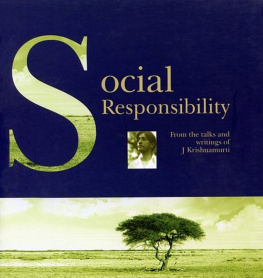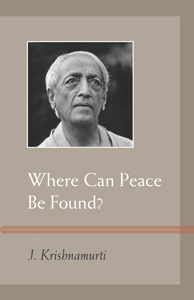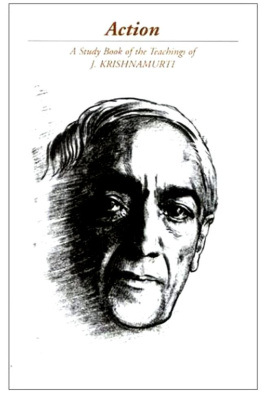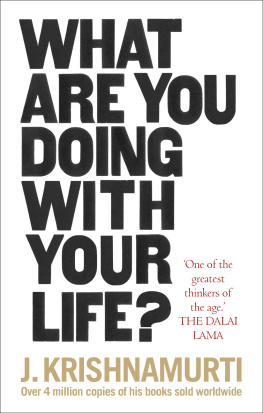Krishnamurti - Social Responsibility
Here you can read online Krishnamurti - Social Responsibility full text of the book (entire story) in english for free. Download pdf and epub, get meaning, cover and reviews about this ebook. publisher: Krishnamurti Foundation of America, genre: Religion. Description of the work, (preface) as well as reviews are available. Best literature library LitArk.com created for fans of good reading and offers a wide selection of genres:
Romance novel
Science fiction
Adventure
Detective
Science
History
Home and family
Prose
Art
Politics
Computer
Non-fiction
Religion
Business
Children
Humor
Choose a favorite category and find really read worthwhile books. Enjoy immersion in the world of imagination, feel the emotions of the characters or learn something new for yourself, make an fascinating discovery.
- Book:Social Responsibility
- Author:
- Publisher:Krishnamurti Foundation of America
- Genre:
- Rating:4 / 5
- Favourites:Add to favourites
- Your mark:
- 80
- 1
- 2
- 3
- 4
- 5
Social Responsibility: summary, description and annotation
We offer to read an annotation, description, summary or preface (depends on what the author of the book "Social Responsibility" wrote himself). If you haven't found the necessary information about the book — write in the comments, we will try to find it.
Social Responsibility — read online for free the complete book (whole text) full work
Below is the text of the book, divided by pages. System saving the place of the last page read, allows you to conveniently read the book "Social Responsibility" online for free, without having to search again every time where you left off. Put a bookmark, and you can go to the page where you finished reading at any time.
Font size:
Interval:
Bookmark:
Social Responsibility
J. Krishnamurti
Contents
I. Introduction: What Can I Do?
I think we ought to ask fundamental questions of ourselves and not await the answers from others. These fundamental questions must be answered by each one of us and we must not depend on theoreticians, however clever, erudite, scholarly or experienced. For the world is in terrible confusion, mounting sorrow and we are responsible for this; each human being throughout the world is responsible for this frightening confusion. Apparently we depend for explanations on others and we are satisfied with these explanations; but all explanations are naturally verbal and therefore of no great importance. Any description, any explanation of the actual state of the world is useless, it has no meaning; but most of us are satisfied by words, intellectual explanations which have been woven beautifully, or very subtly. It seems to me that we must be beyond all these explanations, whether they are offered by the churches, by the Communists, or by any group of people who are asserting themselves.
What is very important is to ask ourselves these fundamental questions, and to be utterly responsible in finding not only the answer, but, in the very answering of these questions, to act. Because with us action is not part of the question and its answer. Surely in the fact of asking these fundamental questions and in discovering the answers for ourselves, that very discovery must be expressed in action. The questioning, the answering and the action are simultaneous and not separate. Because when they are separate then everything is broken up into departments, categories; and out of that division arise prejudices, conflicts, opinions and judgments. Whereas, it seems to me, if we could really ask, in the very asking we would discover the understanding of question and action; they are not separate. And during these talks, I hope we shall be able not only to ask ourselves these questions but also to understand them, not intellectually or verbally, but with our hearts and with our minds. In this process of understanding, action takes place.
One of the fundamental questions consists in mans relationship to reality. That reality has been expressed in different ways: in the East in one way and in the West in another. If we do not discover for ourselves what that relationship is, independently of the theoreticians and the theologians and the priests, we are incapable of discovering what relationship with reality is. That reality may be named as Godand the name is really of very little importancebecause the name, the word, the symbol, is never the actual, and to be caught in symbols and words seems utterly foolishand yet we are so caught, Christians in one way, Hindus, Muslims and others in other waysand words and symbols have become extraordinarily significant. But the symbol, the word, is never the actual, the real thing. So in asking the question, as to what is the true relationship of man to reality, one must be free of the word with all its associations, with all its prejudices and conditions. If we do not find that relationship, then life has really very little meaning; then our confusion, our misery is bound to grow, and life will become more and more intolerable, superficial, meaningless. One must be extraordinarily serious to find out if there is such a reality, or if there is not, and what is mans relationship to it.
Now we want to find out first if there is something immeasurable (beyond all reach of thought, above all measurement) a thing that cannot possibly be touched by words, that has no symbol. Is it possible, first of allnot mystically, not romantically or emotionally, but actuallyto discoverer, or to come upon this extraordinary state? The ancients and some who throughout the world have perhaps come upon it unknowingly, have said there is something. Serious-minded men for millions of years have attempted to find that. Those who are casual, flippant, have their own reward, their own way of life, but there is always a small minority who are really earnest, who come upon this endless, measureless thing. To understand it, one must obviously be free of all dogma, of all belief, of all the traditional impediments which condition the mind, which are merely inventions of thought. We are human beings, suffering, lonely, confused, in great sorrow, whether we call ourselves Communists or Socialists or anything elsewe are human beings. But apparently the important thing for us is the label, French, German or any other. It is important to be free from all this because you need freedom, not merely verbally but actually. It is only in freedom that you can discover what is the real, not through beliefs and dogmas.
So, if one is really earnest in the sense that one is willing to go to the very end, then there must be this freedomfreedom from all nationalities, freedom from all dogma, ritual, beliefs. And apparently this is one of the most difficult things to do. You find in India people who have thought a great deal about these matters and yet they remain soaked in Hindu tradition. In the West they are immersed in the Catholic, Protestant, or Communist dogmas and so they cannot possibly break through. And if one is to have a different kind of life, a life at a different dimension, one must not only be free consciously from all this, but also deep down in the very roots of ones being. Then only is one capable of really looking, seeing. Because to find reality the mind must be sane, healthy, highly intelligent, which means highly sensitive.
What is important is to have a mind that has never been tortured, never been forced into a certain pattern. As one observes throughout the world, religions have maintained that to find reality you must torture yourself, you must deny everything, every sensuous pleasure, you must discipline yourself until your whole mind is shaped according to a pattern which has been established; so that the mind, at the end, has lost the pliability, the quickness, the sensitivity, the beauty of movement. What is necessary is a mind that is untortured, a mind that is very clear. And such a mind is not possible if it has any kind of prejudice. You know one of the most difficult things is to observe, to look: to look at anything without the image of that thing, to look at a cloud without the previous associations with regard to that cloud, to see a flower without the image, the memories, the associations, concerning that flower. Because these associations, these images and memories, create distance between the observer and the observed. And in that distance, the division between the seer and the thing seen, in that division the whole conflict of man exists. It is necessary to see without the image, so that the space between the observer and the thing observed is simply not there. When that space exists then there is conflict, which we shall go into, if we have time, this evening. So the art of seeing is very important. As we said, if we see ourselves with the images which we have built about ourselves, then there is conflict between the image and the fact. And all our life is this conflict between what is and what should be.
Now, please, do not merely listen to these words, phrases and expressions, but observe as we go along, not analytically, but actually observe the process of your own mind; see how it is working, how it is looking at itself. Then you will be actually listening, not trying to translate what you hear according to your prejudices and conditioning. Because the world is in such a frightful state, there is such catastrophe and misery that we must live a different kind of life, there must be fundamental revolution in our way of living. Man has apparently chosen war, conflict, as the way of life and there is a revolt among the young against all this. But unfortunately such a revolt has very little meaning unless one has found for oneself the basic answers to the fundamental questions of life.
Next pageFont size:
Interval:
Bookmark:
Similar books «Social Responsibility»
Look at similar books to Social Responsibility. We have selected literature similar in name and meaning in the hope of providing readers with more options to find new, interesting, not yet read works.
Discussion, reviews of the book Social Responsibility and just readers' own opinions. Leave your comments, write what you think about the work, its meaning or the main characters. Specify what exactly you liked and what you didn't like, and why you think so.










